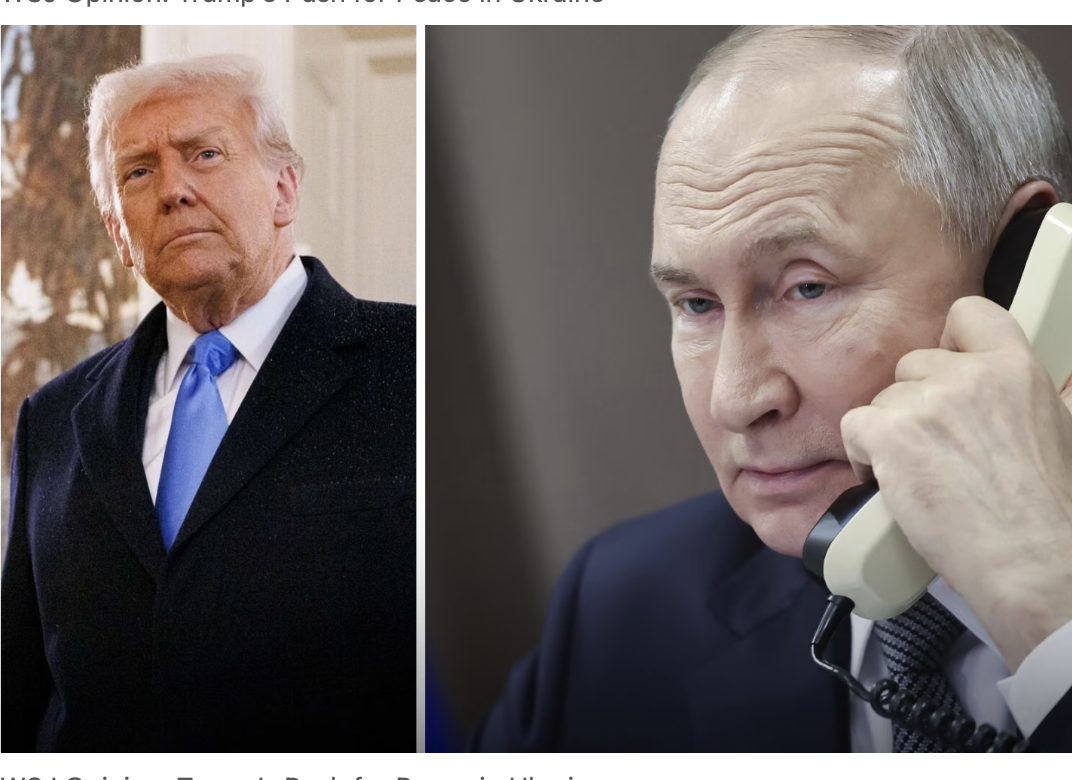By: The Editorial Board – wsj.com – February 16, 2025
The allies receive bracing, if not always helpful, warnings from the U.S.
Start with the Ukraine war. This is the largest military conflict on European soil since 1945, and the Continent’s leaders recognize the stakes for their security. But Mr. Trump’s message is that the U.S. doesn’t care what Europeans think about how the war should be resolved.
Mr. Trump spoke on the phone to Russian President Vladimir Putin last week about ending the conflict, a development that caught Europe by surprise. Defense Secretary Pete Hegseth announced, also without consulting allies, that Ukraine shouldn’t expect to regain territory lost during Russia’s first incursion in 2014. Asked at a conference whether Europeans would play a role in peace talks, Mr. Trump’s Ukraine envoy Keith Kellogg said “that is not going to happen.”
These are slaps to North Atlantic Treaty Organization allies whose security is threatened by Mr. Putin’s imperial ambitions and that have contributed cash and equipment toward Ukraine’s defense. The insults also recognize reality, however. Too many European governments, especially the largest, have been too slow and stingy in providing support to Kyiv either for lack of strategic conviction or decades of spending on welfare instead of their militaries.
The Trump Administration appears unwilling to let Europe leverage its noisy but dilatory contributions to the Ukraine war into a seat at the negotiating table. Much of Mr. Trump’s approach to peace talks is all wrong for America’s own interests, including Mr. Hegseth’s hint that the U.S. could agree with the Kremlin to reduce American troop numbers in Europe. But Europe has chosen to put itself in the position of taking others’ decisions about its security rather than making its own.
Which is what we take to be Team Trump’s bigger theme in Europe last week. At a summit on artificial intelligence in Paris, Vice President JD Vance offered a bracing warning that Europe will leave itself behind in the next industrial revolution if it overregulates today’s frontier technology. Europeans aren’t accustomed to being told so bluntly by U.S. officials that Europe is impoverishing itself with its dirigisme, but someone had to say it.
Then in Munich Mr. Vance delivered a more surprising rebuke when he asserted that Europe’s biggest security danger is “the threat from within.” He cited a political culture that aggressively tamps down on dissent, often in the name of combating “misinformation” or other ills such as racism, as mainstream politicians worry their power will be eroded by insurgent parties of the right and left. The subtext is that if Europeans expect Americans to defend Europe for the sake of democracy, Europe needs to be recognizably democratic.
These interventions have triggered howls across Europe, sometimes with reason: German politicians have cause to be aggrieved at Mr. Vance for expressing veiled sympathy for the far-right Alternative for Germany (AfD) party a week before an election. It was a mistake, since he undermined center-right Friedrich Merz, who’s likely to be the next chancellor and is much more pro-American than the AfD.
Yet in general Europeans are glumly conceding the Trump team has a point, at least on Ukraine and defense matters. French President Emmanuel Macron is convening an emergency summit of key European leaders this week to discuss their approach to Ukraine talks. They should heed Mr. Kellogg’s exhortation that the way for Europe to play a role is “coming up with concrete proposals, ideas, ramp up [defense] spending.”
On the latter point, British Prime Minister Keir Starmer said this weekend he’d overrule his own chancellor of the exchequer and insist defense spending rise to 2.5% of GDP, rather than the Treasury’s preferred 2.3% goal. Yet military leaders think more is needed, and even this goal has no deadline and will involve messy politicking in an economy that’s barely growing and when the government finances are a mess. Hence Mr. Vance’s exhortations about the importance of economic growth.
***
A U.S. withdrawal from Europe would be a historic mistake, and damaging to American interests. But after last week Europe is on notice that Mr. Trump may be willing to leave the Continent to its own devices. Europe needs to act accordingly, and an economic revival and greater investment in its own defense are essential and urgent.
To see this article in its entirety and to subscribe to others like it, please choose to read more.
 Listen Online
Listen Online Watch Online
Watch Online Find a Station in Your Area
Find a Station in Your Area









 Listen Now
Listen Now Watch Online
Watch Online
